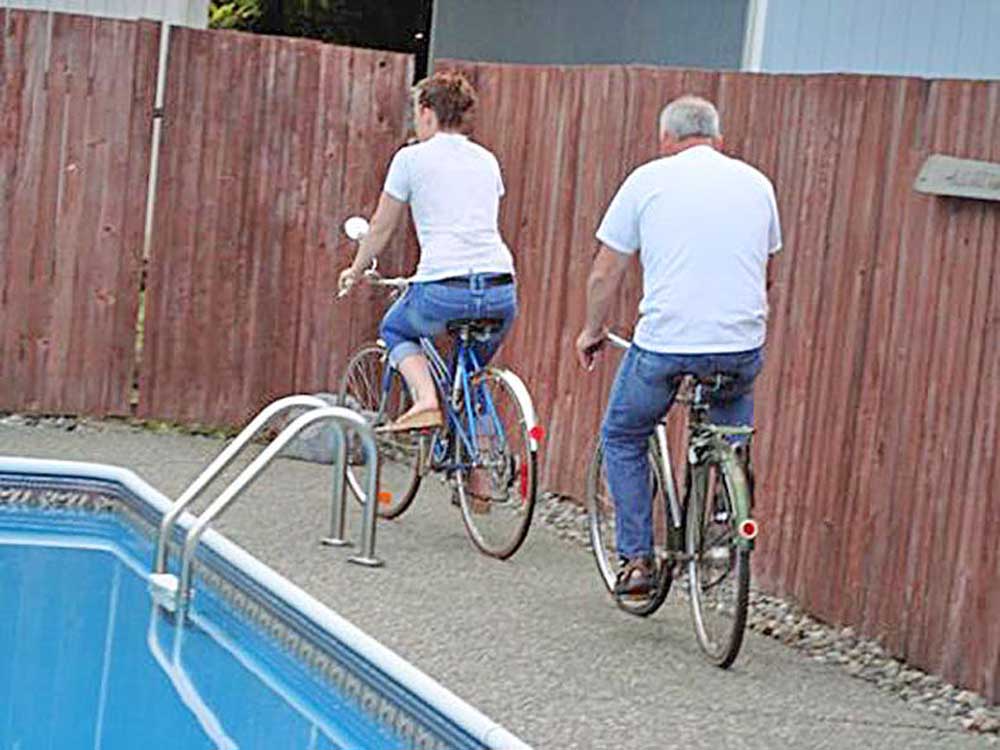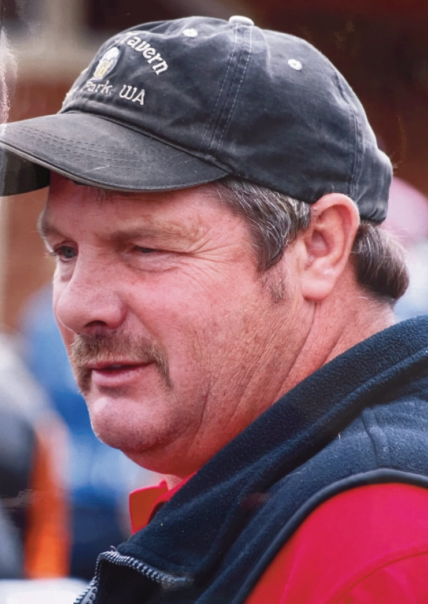Column: ‘Ma’am, we don’t want your house’
Published 8:12 am Monday, November 7, 2022

- The 2008 housing crash brought economic disaster to columnist Leisa Jennings’ family, turning them from pool-owning real estate investors into people who found it difficult to even find a place to rent.
This old house of ours is built on dreams,
Trending
And a business man don’t know what that means.
There’s a swing outside the kids play on every day,
And tomorrow morning the man from the bank is gonna come
Trending
And take it all away — take it all away — take it all away.
—Neil Young
Are we heading toward another financial crisis? The climate seems ripe and very reminiscent of 2008. Home values are top dollar and continue to rapidly skyrocket. Banks are rearing their ugly predatory heads again, back to recklessly dangling carrots at home owners, inviting them to get a home equity line of credit for all the equity in the home. “Use it for trips,” they say! “Use it for improvements” — or better yet, “Invest in real estate! Look how the prices are going up? We’ll find a way to get you those loans, whether you can afford them or not or whether you even have a job or not!” I see these ads frequently and I’m constantly plagued with calls advising us to take out a home equity loan. Haven’t we learned anything? I always thought that banks wouldn’t lend to those that couldn’t afford it. Not so, and I learned the hard way.
I lost my house to foreclosure during the 2008 financial crisis in Lynnwood, Washington, along with millions of other homeowners. We were encouraged by numerous banks and financial advisors to take every ounce of equity from the house and buy real estate. “You can’t go wrong! Housing prices are increasing by 17% a year, so you can sell in two years at a huge profit.” Banks needled us daily, simply wearing us down. Who would know that we would buy real estate during the worst year since the Great Depression and we would lose everything. Gullible Gullivers.
Not bitter, exactly
I would not say that I am bitter, exactly. After all, I got to move to a stunning resort town overlooking the Puget Sound. I had not thought about renting a house because I had owned my own for the past 27 years. So many years I had spent complaining about living in an increasingly overbuilt city and how it was turning into the shopping mecca for all of Washington state in what seemed like overnight. Our two-lane highway with no stoplights became three lanes, and then four with a suicide lane, before I could shake a stick. The roaming pastureland with the Cascade Mountains looming in the background became a sea of overcrowded apartment complexes.
It reminds me of the children’s story, “Mike Mulligan and His Steam Shovel.” The story goes, after many years of working together, Mike and “Mary Anne,” his old-fashioned steam shovel, face competition from modern, electric, gasoline-diesel shovels. Looking for work in the newspaper one day hoping to save them from the scrap heap, Mike finds a small town, Popperville, that is about to build a new town hall. The town select-men react with disbelief when Mike makes the claim that he and his steam shovel Mary Anne can dig the cellar in a single day; they protest that it would take a hundred men a week. Mike insists that Mary Anne can indeed finish the job in one day. At sunup the next day, Mike and Mary Anne manage to complete the task before sundown. However, Mike neglects to provide a way out of the cellar. They are stuck below watching Popperville become an industrial bustling city.
In my case, the story did not end as well as the children’s book. In the book, a young boy who had been watching makes the suggestion that Mike take the job of janitor for the town hall, and that Mary Anne should become the boiler for the town hall’s heating system. The town select-men agree and the new town hall is completed before winter. In contrast, I chose, for a variety of reasons, to remain in the cellar for way too long with no boiler.
Going for broke
Brian, my husband, was absolutely correct when he told me that I never wanted to stay in that house in the first place. The urban sprawl was choking us, just as it choked Popperville. Our plan was to let the house increase in value and sell it at top dollar and move to our dream town (wherever I thought that was). But I was definitely Mary Anne, the steam engine. I planned to stay because I really thought that the money from our house equity would eventually increase to the point that it would sustain us in retirement. I had never considered investing in real estate. We could 1) Plan to leave when the price of the house grew high enough to make the money for new digs. But that meant staying in an area I hated. Who wanted to live in the turmoil and industrial growth of Lynnwood? Not me. 2) Because the value of our house had increased so drastically already, we could sell this house now and buy another outright! The thought was so freeing to me and suddenly we were talking about living in places like Hawaii or Florida! I was so arrogantly settled into the life of “owning a house.” If I had only known. This is the mind set we were in when we got ourselves into trouble. We decided to invest in real estate as we were incessantly pressured to do.
We figured the banks must know something we don’t. After all, they are the experts. After 27 years in one home, plenty of equity had certainly been acquired. No sooner than papers were signed and the ink dried — the value of our real estate began to plummet, and that continued until our newly purchased real estate was worth half of what we paid for it. Our tenants all lost jobs and in turn could not pay rent. With no rental income we could not pay the mortgage payments ourselves. This meant lawyers and evictions. We were slowly drained and rung out. Oh, we’d have been millionaires if it had worked out as planned, if only we could have ridden out the storm for a few years until prices started to increase. But our luck was not to be. The bank called many times as months went by with no rental income, requesting payment for my own mortgage, always saying, “Ma’am, we don’t want your house.” In the end, yes, they wanted my house. You’d better believe, banks do want your house.
Free fall
So, yikes, there I was, now renting a small house with no garage and no yard. My house (and my cellar) stayed vacant for months, as the bank had not yet collected its booty. I had just finished the landscaping in my backyard with ornamental cement blocks surrounded by pansies and other perennials. Fruit trees and blueberries were beginning to produce. When I knew we were leaving, I sold the landscaping rockery that I had carefully labored with to outline the trees and ledges. Oh, and I sold all the trees and plants that the rockery went around! We had planted flowering cherry trees and English laurel bushes across the fence that paralleled the busy road and they were finally almost higher than the chain-link fence now, which had been the objective. The huge billion-year-old rhododendrons that came to the top of our roof would be impossible to take with me. I would miss the brilliant massive pink blossoms that loomed into view from my bedroom window. It was uplifting in the mornings, and it hid the view of the bustling street so well. I have to admit, also, and I am not proud of this, that some of the plants that I couldn’t take with me I solidly refused to have someone else own. Therefore, they were given what I like to call the “Kool-aid.” A sort of Jim Jones ending, you see. So, okay, we sold all the cabinets in the garage and anything that was not nailed down.
We even sold the old shed that Mike (before he passed away from MS) and I bought many moons ago, the one the kids were so excited about because it had a loft. It had to be sliced in half (that stung) and put on a flatbed truck, but still, the sale added a cool $800 to our moving kitty. What I remember most about that shed, though, other than painting it to match the house, is how angry I was when Mike wanted to run electricity to it. At this time, he was not able to move his legs as his health had deteriorated, and I was simply not interested in digging in the dirt with a shovel to produce a 4-foot trench for a half block. But I did, and there was electricity to the shed.
I would mostly miss the memories, the memories of 27 years. I would miss the sandbox that my kids played in, the Tonka toys, and the tunnels they made. I would miss the old-fashioned wooden swing set that Mike and I built.
The 25,000-gallon in-ground pool sat eerily empty other than the maple leaves and fir tree needles in the bottom, its blue color now smudged and spotted with mud and debris. It had only been a year previous that we were swimming in this beautiful clean bright blue liner filled with chlorinated clear water. There we were, sitting outside on nice days swimming with family and friends at will. Diving, laughing, and eating, as we had been for the past 20 years. It was expensive, sure, but still we loved it when the kids were small. It was lovely to watch the children and all of their friends playing in the pool, pretending to be dolphins, practicing gymnastics, and competing for the “best diver” award. Later, it was a sort of albatross, if you know what I mean — the expense, the worry. When is some kid going to trip, break a leg, and sue us? There were older kids there that I didn’t know anymore, jumping off the roof of the garage into the pool. That’s not a liability, right? In the end, it seemed like young teens were coming over with the impression that my children owned the house, with a “hey, give me a towel,” and upon leaving just heaving the wet wad up onto the deck. Oh, your mom is so square…
So back to the loss… There is the flat, park-like backyard, three-quarters of an acre, the graveyard for the many deceased family pets throughout the years, from rats, to cats, to our favorite golden retriever, Punch, who my son, Solomon, buried beneath the grape arbor, claiming it was his dog so he would bury him. Something I would most certainly miss, the grape arbor that will yield the most delicious grapes for the new owners, that is, the ones that didn’t get the “Kool-Aid.” But mostly, the memories, the memories of 27 years. I would miss the sandbox that my kids played in, the Tonka toys, and the tunnels they made. I would miss the old-fashioned wooden swing set that Mike and I built.
Picking up the pieces
We tried to buy back our house the next year as it still sat in foreclosure for a price that we actually could have afforded. Alas, they cannot legally resell to the prior owner. There are laws against that. The house was sold eventually for a pittance.
So, where to move after 27 years, hmmm. Where in the world are Leisa and Brian? We tossed around a few ideas and came up with a beautiful resort island that was only a ferry ride from our home. Because I was so devastated at losing four properties and my own house, Brian was bending over backward trying to find something that would excite me. This location seemed like another state with the ferry distance, and that part suited me fine. However, renting in our situation was not as easy as I had figured. I had not accounted for what we looked like on paper. Having paid the mortgage every month on time for 30 years did not matter. Having no jobs, no income, four foreclosures, and a bankruptcy did matter. We stayed at our house until we finally found someone who took pity on us and reluctantly rented a house to us, but only with a very high deposit and three month’s worth of rent ahead of move in. We would start over in the town of Langley on Whidbey Island, and eventually make our way back to the peace of South Bend, Washington.
Brian says I’m “broken.” “I don’t know how to fix you babe,” he said, as if he is looking to reconnect two wires or fix a short. That’s Brian, my electrician, the fixer, the troubleshooter — he gets so frustrated when he just can’t put Humpty Dumpty back together again.
Well, there you have it. Brian and I packed it all up in one day. With eyes steady as lamps, white knuckles gripping the wheel, I drove my white GMC truck loaded with our three Kwansan cherry trees and my twisted filbert, down Larch Way for the last time and onto the Mukilteo-Whidbey Island ferry. I didn’t look back. I couldn’t. When we left I felt like Ma Joad in “The Grapes of Wrath.” As they drove off in the jalopy from Oklahoma to California, her son asks her, “Ain’t ya even gonna look back, Ma?” She answers sadly, “What fer?









